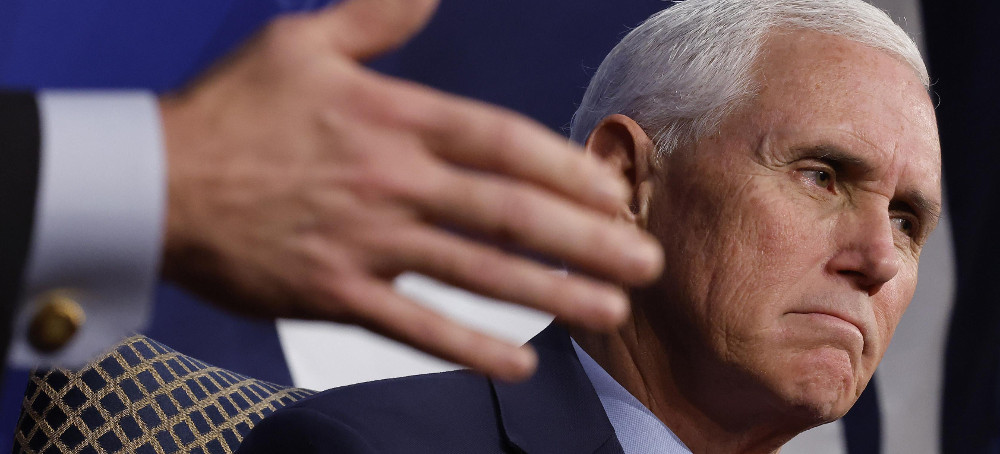Live on the homepage now!
Reader Supported News
The legal claim Pence reportedly intends to make should go nowhere. Even his own written statements fatally undermine it. That suggests another motive. It’s no mystery that as a potential presidential candidate, he doesn’t want to offend Trump’s ponderous Republican base.
Pence’s reported claim to be free from an obligation to testify comes under the Constitution’s “speech and debate” clause. It provides that “Senators and representatives … shall not be questioned in any other Place” than Congress about “any Speech or Debate in either House.” Courts have regularly made clear, however, that the protection extends only to questioning about legislative acts.
Last year, Sen. Lindsey Graham failed when invoking the clause to try to avoid testifying before Fulton County District Attorney Fani Willis’ grand jury about a phone call he made shortly after the November election to Georgia Secretary of State Brad Raffensperger. While one never knows with this radical Supreme Court majority, the same result should apply here.
From the viewpoint of a constitutional scholar and a former federal prosecutor, Pence’s resistance poses an issue of enormous significance for our constitutional system: Can the criminal process count on obtaining every person’s testimony in order to ensure accountability, or are there some people who are above the law when a grand jury seeks the whole truth about a conspiracy to overturn a presidential election?
The case law tells us, in no uncertain terms, that the duty imposed by law on all citizens to testify can reach even those protected by the speech and debate clause. In 1972 the Supreme Court held that the clause does not “immunize a Senator or aide from testifying at trials or grand jury proceedings involving third-party crimes where the questions do not require testimony about or impugn a legislative act.”
For starters, special counsel Smith’s questions about what Trump said in the White House to Pence and others before and even during the Jan. 6 special session wouldn’t be seeking testimony about how anyone acted in a legislative capacity.
Even if Smith were to question Pence about his responses to Trump’s demands that he use his role as presiding officer of the joint session of Congress to steal the election, Pence himself has all but conceded that there was no formal “legislative act” in that role. That morning, he wrote Congress a letter stating unequivocally that his role was “ministerial” and “largely ceremonial” and that the actual “role of Congress is very different” from what his job as presiding officer was.
His letter quoted his esteemed conservative legal adviser, former Court of Appeals Judge J. Michael Luttig, for the proposition that “[t]he only role and power of the Vice President under the Constitution is to count the Electoral College votes as they have been cast.”
To be sure, no court has ever considered the application of the speech and debate clause to the role performed by the vice president in his special function of presiding over the quadrennial joint session when the electoral ballots are opened.
But that responsibility is far less “legislative” in character—and thus further from the purposes of the provision—than the duty a vice president fulfills when breaking a tie in any of the Senate’s lawmaking functions.
Further, testimony regarding criminal actions is not protected by the speech and debate clause. Notably, in 1972, the Supreme Court rejected Maryland Democratic Sen. Daniel Brewster’s claim that the speech and debate clause immunized him from prosecution for allegedly taking a bribe. “Obviously,” the court wrote, bribery is “no part of the legislative function” and is therefore “not a legislative act.”
Surely testimony in Justice Department investigations, like the one being pursued into Trump for conspiring to stay in power, in apparent violation of various federal crimes, is similarly carved out.
Indeed, in the course of ruling in Brewster’s case, the court distinguished “political acts” from “legislative” ones: “[I]t has never been seriously contended that … political matters … have the protection afforded by the Speech or Debate Clause.” What Trump discussed with Pence was as shamefully political as anyone might imagine, and also potentially in violation of laws against obstruction in a congressional proceeding or participating in a seditious conspiracy.
What’s worse is that Pence is trying to have it both ways legally. He invoked the separation of powers to wrap himself in executive branch garb so as to avoid testifying before Congress’ Jan. 6 committee, and now he is invoking a privilege designed to protect lawmakers to wrap himself in legislative branch garb so as to avoid testifying in a grand jury. Heads, he wins; tails, the law’s search for truth loses.
His purpose is transparent. It’s not to protect our legal institutions but to protect himself and his ambition to run for the White House. He knows that courts have consistently shot down claims of separation of powers and executive privilege in the context of attempts by Trump to shield his role in Jan. 6 and the events leading up to it. So Pence now makes a novel, if legally frivolous claim.
In the days ahead as the details of Pence’s conflict with the special counsel become clearer and that legal dispute escalates, you should count on Pence to produce high-minded public statements about how his only goal is to once again preserve and protect the Constitution. This time, don’t believe him.
Follow us on facebook and twitter!
PO Box 2043 / Citrus Heights, CA 95611



No comments:
Post a Comment
Note: Only a member of this blog may post a comment.